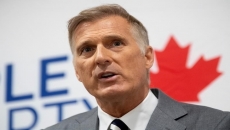OTTAWA - The head of the NATO military alliance threatened to raise the heat on Canada and other laggards on Wednesday as he called on member countries to adopt hard targets when it comes to military spending.
NATO Secretary-General Jens Stoltenberg specifically called for the alliance’s 30 members to recommit to spending two per cent of their national gross domestic product on defence, as Russia’s war in Ukraine and other threats eat into military budgets.
#NATO Defence Ministers addressed key issues for our shared security, taking steps to strengthen deterrence & defence, boost stockpiles, and protect critical undersea infrastructure. We continue to step up support for #Ukraine in their fight for freedom. #defmin pic.twitter.com/fz2i5Uw0vU
— Jens Stoltenberg (@jensstoltenberg) February 15, 2023
Member states, including Canada, first agreed in 2014 to "aim" toward spending two per cent of their GDP on defence over the next decade following Russia’s invasion of Ukraine’s Crimean Peninsula.
Yet Canada has long lagged most of its allies on spending as a share of GDP, and successive federal government have refused to fully commit to the target. They have instead insisted that the spending target is a guideline rather than a requirement.
Speaking to reporters in Brussels following a meeting with defence ministers from across the alliance, including Canada’s Anita Anand, Stoltenberg said allies have started talking about establishing a new spending target.
Some members have suggested that NATO should move toward a 2.5-per-cent guideline. Others say that’s unrealistic.
Rather than raising or lowering the bar, Stoltenberg suggested all allies should be forced to clear it where it is.
"Instead of changing the two per cent, I think we should move from regarding the two per cent as a ceiling to regard the two per cent of GDP as a floor and minimum," he said.
"We need immediate commitment to spend two per cent as a minimum because when we see the needs for ammunition, for air defence, for training, for readiness, for high-end capabilities. It's obvious that two-per-cent defence spending is minimal."
A report released by Stoltenberg last summer estimated Canadian defence spending would decline as a share of GDP to 1.27 per cent last year, down from 1.32 per cent in 2021 and 1.42 per cent in 2020.
Only five NATO allies were projected to spend less of their GDP on the military: Slovenia, Turkiye, Belgium, Spain and Luxembourg. Slovenia and Spain are among those countries that have committed to meeting the two-per-cent target in the next few years.
Anand largely stayed on script when she was asked about the spending target on the sidelines of the Brussels meeting on Wednesday, arguing Canada is stepping up in a variety of ways.
That includes an injection of $8 billion over five years in last year’s federal budget, which would increase spending to 1.5 per cent of GDP by the end. Anand also noted Canada’s role in Latvia, where it is leading a NATO battle group to defend against Russia.
"We need to make sure that we recognize that Canada is the sixth-largest defence spender of the alliance, and in terms of getting new money out the door, Canada is one of the leaders," she added.
There appears to be little political appetite in Ottawa for a significant new injection of cash into the military beyond what has already been promised, particularly as the Trudeau government faces pressure to spend more in other areas such as health care.
The scope of spending required to meet the two per cent target is also staggering, with parliamentary budget officer Yves Giroux having estimated that it would require an extra $75 billion over the next five years.
Many countries also insist that it’s the quality of their equipment and the amount of contributions that allies make to NATO operations that is most important. GDP percentages are also a slippery metric as budgets look bigger when economies tank.
The economy of Turkiye — traditionally one of NATO’s biggest defence spenders — has been ravaged by inflation and its military budget only stood at 1.22 per cent of GDP last year, according to NATO’s estimate.
Still, if other allies heed Stoltenberg's call and try to harden the spending target, it would put real pressure on Canada, said defence analyst David Perry of the Canadian Global Affairs Institute think tank in Ottawa.
NATO is a consensus-based organization, meaning all members will need to agree to any change to the spending target.
"But I do think that the discussion will put even more pressure on allies that are not meeting it and have not indicated plans to not just increase defence spending, but increase defence spending as a share of GDP," Perry said.
"And I do think that for whatever criticism there is in Canada (about the target), other allies do take that metric seriously."
And contrary to the government’s protestations about the target, Perry said the effects of Canada’s refusal to invest more on defence can be seen in the state of its equipment and current personnel shortage.
Even without significant new spending commitments, Perry suggested Ottawa could start to show allies some progress if it was able to spend the money already earmarked for new military equipment in particular.
The Canadian Press reported last month that the Department of National Defence was unable to spend $2.5 billion of its approved budget last year due to delays in various procurement and infrastructure projects.
"We need to revisit and improve our ability to actually implement existing defence policy and spend already-committed money just as much, if not more, than we need to think about additional future spending," he said.





